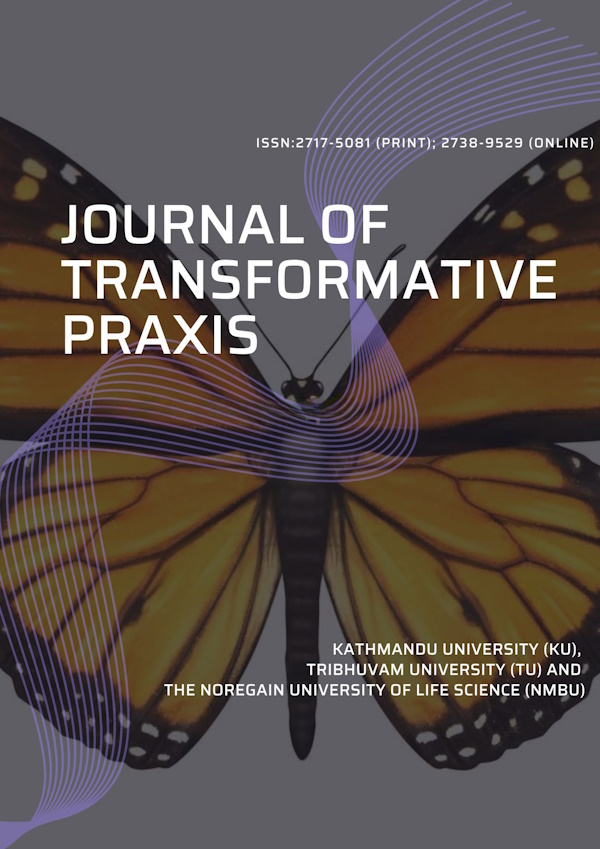
Mangsuk as Indigenous Knowledge Heritage in Yamphu Community: An Estranged Transformative Learning Space
Original Article
Journal of Transformative Praxis, Volume 2, Issue 1, 2021, 19-31, https://doi.org/10.51474/jrtp.v2i1.521
Online publication date: Jun 30, 2021
Publication date: Dec 31, 2021
Views: 655 | Downloads: 449
How to cite this article
APA
In-text citation: (Rai & Rai, 2021)
Reference: Rai, I. M., & Rai, P. (2021). Mangsuk as Indigenous Knowledge Heritage in Yamphu Community: An Estranged Transformative Learning Space. Journal of Transformative Praxis, 2(1), 19-31. https://doi.org/10.51474/jrtp.v2i1.521
Reference: Rai, I. M., & Rai, P. (2021). Mangsuk as Indigenous Knowledge Heritage in Yamphu Community: An Estranged Transformative Learning Space. Journal of Transformative Praxis, 2(1), 19-31. https://doi.org/10.51474/jrtp.v2i1.521
Vancouver
In-text citation: (1), (2), (3), etc.
Reference: Rai IM, Rai P. Mangsuk as Indigenous Knowledge Heritage in Yamphu Community: An Estranged Transformative Learning Space. Journal of Transformative Praxis. 2021;2(1):19-31. https://doi.org/10.51474/jrtp.v2i1.521
Reference: Rai IM, Rai P. Mangsuk as Indigenous Knowledge Heritage in Yamphu Community: An Estranged Transformative Learning Space. Journal of Transformative Praxis. 2021;2(1):19-31. https://doi.org/10.51474/jrtp.v2i1.521
AMA
In-text citation: (1), (2), (3), etc.
Reference: Rai IM, Rai P. Mangsuk as Indigenous Knowledge Heritage in Yamphu Community: An Estranged Transformative Learning Space. Journal of Transformative Praxis. 2021;2(1), 19-31. https://doi.org/10.51474/jrtp.v2i1.521
Reference: Rai IM, Rai P. Mangsuk as Indigenous Knowledge Heritage in Yamphu Community: An Estranged Transformative Learning Space. Journal of Transformative Praxis. 2021;2(1), 19-31. https://doi.org/10.51474/jrtp.v2i1.521
Chicago
In-text citation: (Rai and Rai, 2021)
Reference: Rai, Indra Mani, and Prabin Rai. "Mangsuk as Indigenous Knowledge Heritage in Yamphu Community: An Estranged Transformative Learning Space". Journal of Transformative Praxis 2021 2 no. 1 (2021): 19-31. https://doi.org/10.51474/jrtp.v2i1.521
Reference: Rai, Indra Mani, and Prabin Rai. "Mangsuk as Indigenous Knowledge Heritage in Yamphu Community: An Estranged Transformative Learning Space". Journal of Transformative Praxis 2021 2 no. 1 (2021): 19-31. https://doi.org/10.51474/jrtp.v2i1.521
Harvard
In-text citation: (Rai and Rai, 2021)
Reference: Rai, I. M., and Rai, P. (2021). Mangsuk as Indigenous Knowledge Heritage in Yamphu Community: An Estranged Transformative Learning Space. Journal of Transformative Praxis, 2(1), pp. 19-31. https://doi.org/10.51474/jrtp.v2i1.521
Reference: Rai, I. M., and Rai, P. (2021). Mangsuk as Indigenous Knowledge Heritage in Yamphu Community: An Estranged Transformative Learning Space. Journal of Transformative Praxis, 2(1), pp. 19-31. https://doi.org/10.51474/jrtp.v2i1.521
MLA
In-text citation: (Rai and Rai, 2021)
Reference: Rai, Indra Mani et al. "Mangsuk as Indigenous Knowledge Heritage in Yamphu Community: An Estranged Transformative Learning Space". Journal of Transformative Praxis, vol. 2, no. 1, 2021, pp. 19-31. https://doi.org/10.51474/jrtp.v2i1.521
Reference: Rai, Indra Mani et al. "Mangsuk as Indigenous Knowledge Heritage in Yamphu Community: An Estranged Transformative Learning Space". Journal of Transformative Praxis, vol. 2, no. 1, 2021, pp. 19-31. https://doi.org/10.51474/jrtp.v2i1.521
ABSTRACT
Based on a critical ethnographic research tradition, this paper explores how Mangsuk as an indigenous institution represents a space for cultural-self and relational knowing in the Yamphu indigenous community of Ambote village of Ilam district of eastern Nepal. The paper explores the beliefs, worldviews, and practices of Mangsuk that pass on to adults and children in the community. The paper argues that Mangsuk, as a cultural institution, shapes the emotions, sense of self, particular beliefs, and behaviors among the community people. It further highlights the Mundhum (an oral tradition) associated with the Mangsuk ritual to transfer Yamphu indigenous knowledge, communal values, beliefs, emotionality, spirituality, and worldviews among the kins in the community. Furthermore, the paper portrays how modern education has been side-lining the indigenous ways of transformative learning (cultural self-knowing and relational knowing), resulting in the relegation of indigenous knowledge heritage.
KEYWORDS
REFERENCES
---
LICENSE
This work is licensed under a Creative Commons Attribution-ShareAlike 4.0 International License.
